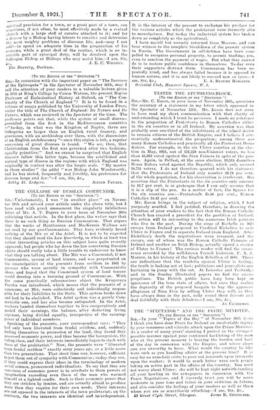THE COLLAPSE OF RUSSIAN COMMUNISM.
[To THE EDITOR OF THE " SPECTATOR."] SIR,—Unfortunately, I was " in another place " on Novem- ber 18th and missed your article under the above title, but I have read with great amusement the singularly infelicitous letter of Mr. A. T. Rogers in your issue of November 26th criticizing that article. In the first place, the writer says that there is no such thing as Russian Communism. That argues that the works of Haxthausen and MacKenzie Wallace are not read by our pro-Communists. They have evidently heard nothing of the Mir or of the Artel. It is not to be expected that they should read the Law Quarterly, in which at least two rather interesting articles on this subject have quite recently appeared; but people who lay down the law concerning Russian affairs should really take a little trouble to endeavour to know what they are talking about. Tho Mir was a Communal, if not Communistic, system of land tenure, and was perpetuated on the emancipation of the peasants from serfdom in 1861 by persons who were secretly in sympathy with Communistic ideas, and hoped that the Communal system of land tenure would develop into a training ground of Communism. With the same practically sub-conscious object the Krugovaya Poruka was introduced, which means that the peasants of a commune, or Mir, were collectively and individually respon- sible for their liabilities to the State. This system broke down and had to be abolished. The Artel system was a purely Com- munistic one, and has also become antiquated. In the Artel, workers banded themselves together to live co-operatively and Pooled their earnings, the balance, after deducting living expenses, being divided equally, irrespective of the earning- power of individual members.
Speaking of the peasants, your correspondent says: " They had only been liberated from feudal serfdom, and, suddenly finding themselves in possession of the land, they found they possessed economic power, and thus became the bourgeoisie, the ruling class, and their interests immediately began to clash with those of the proletariat." Now, the peasants were " liberated from feudal serfdom" exactly sixty years ago, or a little more than two generations. That short time was, however, sufficient to put them out of sympathy with Communism ; to-day they are, if they could express their ideas in the terminology of modern social science, pronounced individualists. To say that they are conscious of economic power is to attribute to them powers of imagination exceeding even those of the man who warmed himself at a lighted candle. Such is their economic power that they are stricken by famine, and are actually afraid to produce more than they require for their own needs. Their interests are not opposed to the interests of the town proletariat; on the contrar.T, the two interests are identical and interdependent.
It is the interest of the peasant to exchange his produce for the various articles which the proletariat were formerly able to manufacture. But to-day the industrial system has broken down as completely as the agricultural.
I have myself but recently returned front Moscow, and can bear witness to the complete breakdown of the present system in Russia. The Government in self-defence have been com- pelled to recognize personal property, to permit trading; yea. even to sanction the payment of wages. But what they cannot do is to restore public confidence in themselves. To-day even their supporters distrust them. Communism has been re- peatedly tried, and has always failed because it is opposed to human nature, and it is not likely to succeed now or later.—I










































 Previous page
Previous page